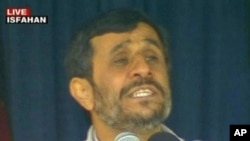Iranian President Mahmoud Ahmedinejad struck a defiant tone in a televised speech. Speaking in the shrine city of Isfahan, he said Tehran would defy world powers even further by producing high-grade uranium, enriched to 20 percent, for its nuclear program.
Mr. Ahmedinejad thumped his fists on the podium lectern as he drove home his point that Tehran could care less about what the outside world thinks of its nuclear program, insisting that "neither Israel, nor its backers can stop it.
He said that he declares that with God's grace, the Iranian nation will produce 20-percent fuel and whatever else it needs on its own. Iran asked the West for the [highly enriched uranium], he insisted, and it tried to use the issue "to pressure us." The International Atomic Energy Agency [IAEA], he claimed, was obligated to provide that fuel.
He also stressed that he is not worried about the military option being used against Iran's nuclear facilities, despite talk of a possible Israeli attack:
He said many people warned him, when he visited the United Nations in September, that Israel would attack Iran's nuclear facilities. He said that is media hyperbole, because there is nothing that Israel can do to stop us.
The Iranian president repeated a phrase that he used during Iran's presidential campaign, last spring, saying Iran's "nuclear dossier is closed, and will not be reopened."
Mr. Ahmedinejad also expressed disappointment with U.S. President Barack Obama, noting that he was "not happy" with the direction dialogue between the two countries was taking, and that he feared Mr. Obama would be influenced by Israel to take a harder stance against Tehran.
It was the second day, Mr. Ahmedinejad grabbed the spotlight on national TV to drive home the point that he is in charge of the country's nuclear agenda and that he would not compromise an inch.
The Iranian president criticized Russia, on television Tuesday, saying Tehran was disappointed with Moscow and Iran did not need its help, anyway.
He says he is disappointed over Russia's decision to join an IAEA censure of Tehran's nuclear program, and he believes Moscow's decision was wrong, and the Russians do not have an accurate conception of Iran's nuclear program. Moscow's help, he added, is based on self-interest and the Russians need us more than we need them.
He also repeated Tehran's habitual claim that it is "not seeking nuclear weapons," citing Iran's Supreme Leader Ayatollah Ali Khamenei, who has said "Islam is against atomic weapons."
Mr. Ahmedinejad also stressed that any further U.N. sanctions against Tehran "would be futile," because, as he put it, "it is impossible to isolate a country like Iran, in [today's] multipolar world."
News
Iranian President says Tehran to Produce High-Grade Uranium
update

President Mahmoud Ahmedinejad strikes a defiant tone in a televised speech, saying Tehran would produce 20-percent high-grade uranium for its nuclear program.




